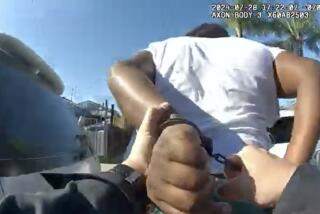No Mistaking the Terror of Persecution
- Share via
This city--no, this nation--is up in arms over a bloodcurdling beating Los Angeles police officers gave a man apprehended after allegedly leading them on a high-speed chase.
If there are two things in this world with which I cannot fully relate, they are what it must be like to fearlessly do the difficult, dangerous work of a cop and what it must be like to fearfully feel persecuted because of the color of my skin.
But I do know this:
Los Angeles is rarely pictured nationally as a hotbed of violence, despite the Watts riots, gang wars and freeway shootings. Some Californians would have you believe that New York, Miami or Detroit, for example, are far more dangerous places.
Joe Morgan and Jamaal Wilkes could tell them a story or two.
Being a big-time sports figure can be helpful when you want a restaurant reservation or a favor, but it did Wilkes and Morgan little good in their first-hand encounters with L.A. law.
Morgan, the baseball Hall of Famer and television sportscaster, recently won a lawsuit verdict of more than half a million dollars after being manhandled by authorities at Los Angeles International Airport, who mistook him for a drug courier.
Wilkes, the former UCLA and Laker basketball star, was detained and handcuffed by police officers last Dec. 10. He was not speeding. He was driving his Pontiac Trans-Am a few blocks from his office, which handles financial and real-estate investments. He was stopped because he was driving in “a high-robbery area,” a police official said.
Now, I know cops have a job to do. And I know that even the most outstanding private citizens have dark secrets.
But if Joe Morgan is a drug runner and Jamaal Wilkes a thief, I am a mass murderer.
Mistaken identity may be an everyday occupational hazard for cops and suspects, but in light of recent events, one can only imagine the fear of someone who can’t understand the suddenness and savagery of what is happening to him.
The man from the car chase, seen being bludgeoned by nightsticks on homemade videotape, was detained because police reportedly pursued him doing anywhere from 80 to 110 m.p.h. And the suspect evidently was out on parole from a 1990 robbery conviction.
That would explain some of what happened, though hardly justifying all of it.
But Joe Morgan, approached by a Los Angeles narcotics officer at the airport one day in 1988, stated in his lawsuit that he was yanked by the neck, hurled to the floor and handcuffed. That indignity took place before a large crowd of people, not all of whom could be sure that the cops had the wrong man.
It took nearly three years, but a federal jury recently awarded Morgan $540,000, with one of the jurors quoted later saying: “Police cannot act uncontrollably.”
Justice done or not, Joe Morgan today cannot walk through the L.A. airport without occasionally looking over his shoulder.
As for Jamaal Wilkes, perhaps someday he will commit a traffic violation, will see the flashing lights in his rear-view mirror and will deal with it as best he can. But that won’t keep him from remembering what happened last December.
Bad neighborhood or not, it was not late--around 8:30 p.m.--and he was not driving recklessly. Two officers ordered Wilkes from his car. He was handcuffed and told there was a felony warrant out for him.
Wilkes said he didn’t know what they were talking about. The cops rechecked their computer and found they were mistaken. When he asked on what grounds he had been stopped, at first, according to Wilkes, he was told that his license-plate tag was “about to expire,” as though that would be a crime. Then they said the bulb over his license plate was not illuminated, which he claimed was untrue.
Anyway, pretty dangerous dude, this Wilkes, driving around with his plate unlit.
Unlike Morgan, Wilkes doesn’t intend to pursue the matter legally. But he also doesn’t intend to let it drop.
He happens to be a member of the Los Angeles Urban League’s board, which insisted upon a public apology. The league’s president, John Mack, although sympathetic to law-enforcement difficulties, said he was concerned about police believing they have “a blank check to harass innocent people” and that if such a thing could happen to Jamaal Wilkes, he feared for those whose stories would never be told.
Wilkes, too, stressed that he was polite and cooperative as could be, because: “With all you read in the papers or see on television, it is very easy to become just another statistic.”
When he said it, he wasn’t thinking of the incident with the man beaten with the cops’ clubs.
It hadn’t yet happened.
More to Read
Sign up for Essential California
The most important California stories and recommendations in your inbox every morning.
You may occasionally receive promotional content from the Los Angeles Times.













